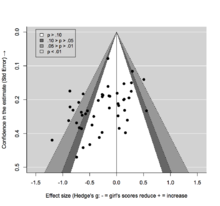| Established | 2012 |
|---|---|
Parent institution | Tilburg University |
| Location | , Netherlands |
| Website |
metaresearch |
The Meta-Research Center at Tilburg University is a metascience research center within the School of Social and Behavioral Sciences at the Dutch Tilburg University. They were profiled in a September 2018 article in Science. [1]
Research

Meta-research aims to improve reproducibility by studying how science is practiced and published and developing better ways for the scientific community to operate.
The research institute has published a large statistical meta-analysis of studies on the effect of Stereotype threat on girls' mathematics performance. They also use methods for estimating publication bias. [2]
The research institute has developed an R based software tool called Statcheck that can detect incorrect statistical methods used in research articles. A large amount of statistical errors were detected in a sample of 50 000 psychology research articles. [3] The use of it was perceived negatively by some of the researchers. [4] [5] [6] The data mining practices of the research center have been in conflict with the policies of scientific publisher Elsevier. [7]
A scientific misconduct case in the field of social psychology at Tilburg University has been a contributing factor in establishing the research center. [4]
Advocacy
The research center makes recommendations for other researchers about how to avoid publication bias and to improve the statistical strength of results. They have stated support for pre-registration of studies and open sharing of research data. [5]
See also
- Meta-research
- Scientometrics
- Addressing the replication crisis
- List of metascience research centers and organisations
References
- ^ Stokstad, Erik (2018). "The truth squad". Science. 361 (6408): 1189–1191. Bibcode: 2018Sci...361.1189S. doi: 10.1126/science.361.6408.1189. ISSN 0036-8075. PMID 30237339.
- ^ a b Flore, Paulette C.; Wicherts, Jelte M. (2014). "Does stereotype threat influence performance of girls in stereotyped domains? A meta-analysis". Journal of School Psychology. 53 (1): 25–44. doi: 10.1016/j.jsp.2014.10.002. ISSN 0022-4405. PMID 25636259.
- ^ Nuijten, Michèle B.; Hartgerink, Chris H. J.; Van Assen, Marcel A. L. M.; Epskamp, Sacha; Wicherts, Jelte M. (2015). "The prevalence of statistical reporting errors in psychology (1985–2013)". Behavior Research Methods. 48 (4): 1205–1226. doi: 10.3758/s13428-015-0664-2. PMC 5101263. PMID 26497820.
- ^ a b Buranyi, Stephen (2017-02-01). "The high-tech war on science fraud". the Guardian. Retrieved 2017-02-22.
- ^ a b Monya Baker (2015-10-28). "Smart software spots statistical errors in psychology papers". Nature News & Comment. doi: 10.1038/nature.2015.18657. Retrieved 2017-02-25.
- ^ Buranyi, Stephen (2016-09-05). "Scientists Are Worried About 'Peer Review by Algorithm' - Motherboard". motherboard.vice.com. Retrieved 2017-02-24.
- ^ Jozien Wijkhuis (2015-11-23). "PhD student stops research because of Elsevier conflict | Univers". Univers. The Independent News Website of Tilburg University. Retrieved 2017-02-25.
External links
-
"Meta-Research Center". Retrieved 2017-02-22.
School of Social and Behavioral Sciences
| Established | 2012 |
|---|---|
Parent institution | Tilburg University |
| Location | , Netherlands |
| Website |
metaresearch |
The Meta-Research Center at Tilburg University is a metascience research center within the School of Social and Behavioral Sciences at the Dutch Tilburg University. They were profiled in a September 2018 article in Science. [1]
Research

Meta-research aims to improve reproducibility by studying how science is practiced and published and developing better ways for the scientific community to operate.
The research institute has published a large statistical meta-analysis of studies on the effect of Stereotype threat on girls' mathematics performance. They also use methods for estimating publication bias. [2]
The research institute has developed an R based software tool called Statcheck that can detect incorrect statistical methods used in research articles. A large amount of statistical errors were detected in a sample of 50 000 psychology research articles. [3] The use of it was perceived negatively by some of the researchers. [4] [5] [6] The data mining practices of the research center have been in conflict with the policies of scientific publisher Elsevier. [7]
A scientific misconduct case in the field of social psychology at Tilburg University has been a contributing factor in establishing the research center. [4]
Advocacy
The research center makes recommendations for other researchers about how to avoid publication bias and to improve the statistical strength of results. They have stated support for pre-registration of studies and open sharing of research data. [5]
See also
- Meta-research
- Scientometrics
- Addressing the replication crisis
- List of metascience research centers and organisations
References
- ^ Stokstad, Erik (2018). "The truth squad". Science. 361 (6408): 1189–1191. Bibcode: 2018Sci...361.1189S. doi: 10.1126/science.361.6408.1189. ISSN 0036-8075. PMID 30237339.
- ^ a b Flore, Paulette C.; Wicherts, Jelte M. (2014). "Does stereotype threat influence performance of girls in stereotyped domains? A meta-analysis". Journal of School Psychology. 53 (1): 25–44. doi: 10.1016/j.jsp.2014.10.002. ISSN 0022-4405. PMID 25636259.
- ^ Nuijten, Michèle B.; Hartgerink, Chris H. J.; Van Assen, Marcel A. L. M.; Epskamp, Sacha; Wicherts, Jelte M. (2015). "The prevalence of statistical reporting errors in psychology (1985–2013)". Behavior Research Methods. 48 (4): 1205–1226. doi: 10.3758/s13428-015-0664-2. PMC 5101263. PMID 26497820.
- ^ a b Buranyi, Stephen (2017-02-01). "The high-tech war on science fraud". the Guardian. Retrieved 2017-02-22.
- ^ a b Monya Baker (2015-10-28). "Smart software spots statistical errors in psychology papers". Nature News & Comment. doi: 10.1038/nature.2015.18657. Retrieved 2017-02-25.
- ^ Buranyi, Stephen (2016-09-05). "Scientists Are Worried About 'Peer Review by Algorithm' - Motherboard". motherboard.vice.com. Retrieved 2017-02-24.
- ^ Jozien Wijkhuis (2015-11-23). "PhD student stops research because of Elsevier conflict | Univers". Univers. The Independent News Website of Tilburg University. Retrieved 2017-02-25.
External links
-
"Meta-Research Center". Retrieved 2017-02-22.
School of Social and Behavioral Sciences